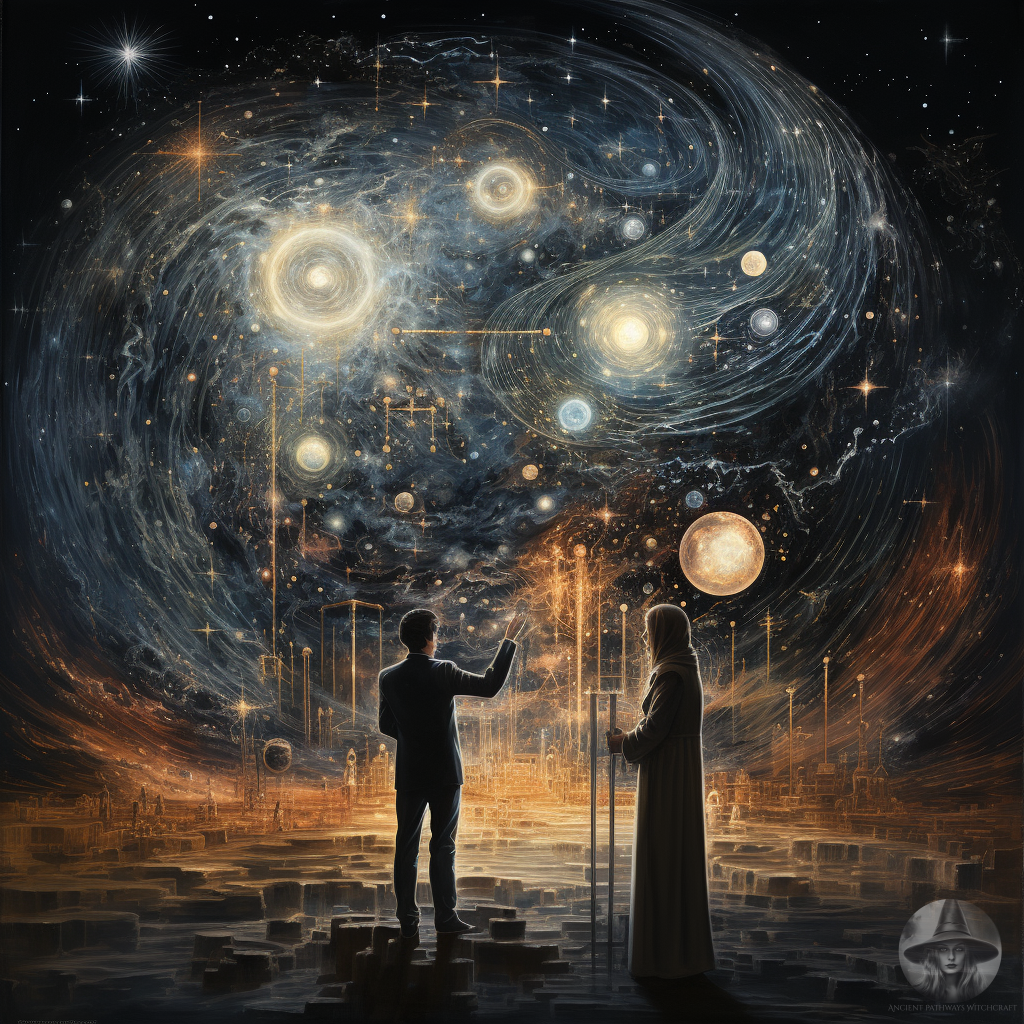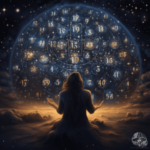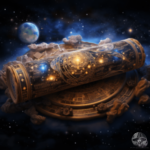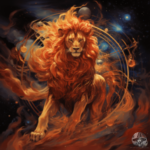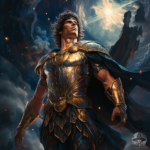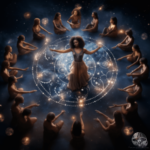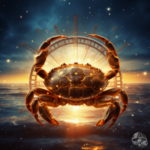Stargazers' Saga: The Cosmic Clash and Harmony of Astrology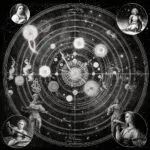 and Astronomy
and Astronomy
In the vast realm of the cosmos, we find two disciplines seeking to understand the universe and our place in it—Astrology and Astronomy. While they may share common roots and a fascination with celestial bodies, the way they explore and interpret the universe varies significantly.
Astrology: An Ancient Cosmic Language
Astrology is an enduring tradition, tracing its origins back to ancient civilizations. It sees the universe as an interconnected web where celestial bodies' movements and positions can influence human affairs and the natural world. While some see astrology as a form of art or entertainment, it's much more profound than that.
Astrologers, like astronomers, have been observing and documenting celestial patterns for centuries. Their studies have led them to believe that external cosmic forces—like gravitational pull and electrical impulses—can impact human behavior and thought processes, akin to how the moon's gravitational pull affects ocean tides.
Astrologers generate horoscopes based on an individual's date, time, and place of birth. They interpret the relative positions of the Sun, Moon, planets, and sometimes even comets and fixed stars. Each celestial body and its position within a particular constellation at the time of birth is believed to shape our personalities, impact our relationships, and play a part in determining our destiny.
Astronomy: The Scientific Study of the Cosmos
While sharing historical roots with astrology, astronomy took a separate path focused on the scientific exploration of the universe. This divergence came when astronomers like Copernicus, Kepler, and Galileo realized that planets orbited the Sun, not the Earth, and Newton revealed the physical laws behind these celestial bodies' behaviors.
Astronomy today focuses on understanding the physical properties of galaxies, stars, planets, comets, asteroids, and phenomena outside Earth's atmosphere. It is a data-driven discipline rooted in mathematics, physics, and chemistry. Astronomers measure celestial bodies' positions, luminosity, spectra, and movements, seeking to explain their origins, evolution, and potential futures.
Astronomy embraces an understanding that the cosmos is a vast and diverse place. For example, the zodiac constellations known to Western society—dating back to Mesopotamia—aren't universal. Different cultures, like the Incas, had their unique ways of interpreting the sky, focusing on the dark patches in the Milky Way rather than distinct star patterns.
Further complicating matters, astrology's twelve zodiac signs don't line up neatly with their corresponding constellations. This discrepancy exists because the constellations vary significantly in size and shape. As such, the Sun passes through certain constellations—like Scorpio—much faster than others, like Taurus.
Precession of the Equinoxes: A Cosmic Wobble
The primary reason for astrological signs not aligning with their corresponding constellations is a wobble in Earth's rotational axis called precession. Caused by the gravitational pull of the Moon and Sun on Earth's equatorial bulge, this wobble causes Earth's axis to swing in a slow circle over about 25,800 years.
This movement gradually alters our view of the zodiac from Earth, making constellations appear to shift to the east—roughly a degree per human lifetime. This slow but observable shift was first noticed by Hipparchus of Nicaea around 150 B.C.
As a result of precession, the first day of spring—or the vernal equinox—has moved across the zodiac over centuries. While it was in Aries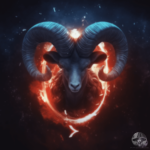
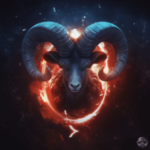
This fundamental celestial shift, while challenging for some astrological traditions, offers yet another testament to the cosmos' beautiful complexity and our evolving understanding of it.
The Birthdate Misalignment: A Tale of Shifting Stars and Personal Alignments
In discussions delving into the details of astrology and astronomy, the apparent disconnect between zodiac signs and the actual constellations often takes center stage. This discrepancy, known as the "precession of the equinoxes," traces back to an intriguing astronomical phenomenon.
The Earth's axial precession, akin to a slow, wobble-like motion, instigates a shift in the apparent position of constellations in our night sky over centuries. This shifting backdrop leads to a situation where, during your birth, the Sun might have appeared to rise in a different constellation than what your traditional zodiac sign signifies. So, while your astrologer might label you an Aries, an astronomer could argue that the Sun was, in reality, nestled in the constellation of Pisces when you were born.
However, when you read a generic horoscope in a newspaper, magazine, or online, knowing your 'true' sign, based on precise birth date, time, and location, is essential. This precision extends beyond your Sun sign (the zodiac sign that the Sun was in at your time of birth) and encompasses an array of other astrological factors. For instance, using my birth details as a case in point: in both Western and Vedic Astrology, I am an Aries. However, my rising or ascendant sign is Capricorn Rising. At the time of my birth, the Sun was in Aries, and the Moon was in Leo, with the Sun in the 8th House and the Moon in the 3rd House. My stellium (a group of three or more planets in a single sign or house) comprises Saturn, Mercury, and Venus. I can tell you where every plant was, but I think you get the point.
Such personal comprehensive astrological profiles provide more insight and lend greater depth to horoscope readings, serving as guiding posts for intuitive interpretations of how your day may unfold. And while these celestial alignments may present a likely script, as humans, we hold the free-will to steer our life's narrative, using these astrological insights to our advantage to shape potential future events.
The horoscopes I post are based on someone being born that day, at the time I start pulling the data, at my location. It is one of the reasons my articles are not consistent on publication times, because I pull the data for that day.
The Diverse Universe of Astrology
Astrology is a rich tapestry of beliefs and practices, varying significantly across cultures and civilizations. Each system interprets celestial influences in its unique way, adding to astrology's diverse and colorful landscape. In a previous article titled "The Differences Between Vedic & Western Astrology," I explored some of these systems in detail. Here's a brief recap:
Western Astrology, widely followed in Western countries, aligns its zodiac with the seasons. It uses the tropical zodiac, which remains in sync with the vernal equinox, rather than the actual positions of constellations.
Vedic Astrology, also known as Jyotish, is a fundamental part of Indian tradition. It aligns its zodiac with the constellations, closely mirroring how astronomers view the cosmos.
Chinese Astrology follows a different rhythm altogether. It adopts a lunar calendar and associates each year with a specific animal sign in a repeating 12-year cycle.
A Harmonious Universe: Astrology and Astronomy Together
Astrology and astronomy, while different in approach and perspective, both offer us unique ways of understanding our place in the universe.
Astronomy, through its rigorous scientific inquiry, broadens our knowledge of the cosmos, revealing the physical properties and behaviors of celestial bodies. It unravels the mechanics of galaxies, stars, planets, and other cosmic phenomena, continually expanding our understanding of the universe's vast expanse.
Astrology, on the other hand, provides a symbolic language that illuminates the human experience through the cosmos' lens. It offers paths to self-discovery and emotional reflection, using the celestial patterns to shed light on our personalities, relationships, and life's purpose.
Despite their differences, astrology and astronomy can harmoniously coexist, each enhancing our cosmic journey in its unique way. Respect and appreciation for these distinct but interconnected disciplines are essential. So, the next time you find yourself gazing at the night sky or contemplating your place in the cosmos, remember—both astrology and astronomy can guide you, offering insights from their respective corners of the universe.
